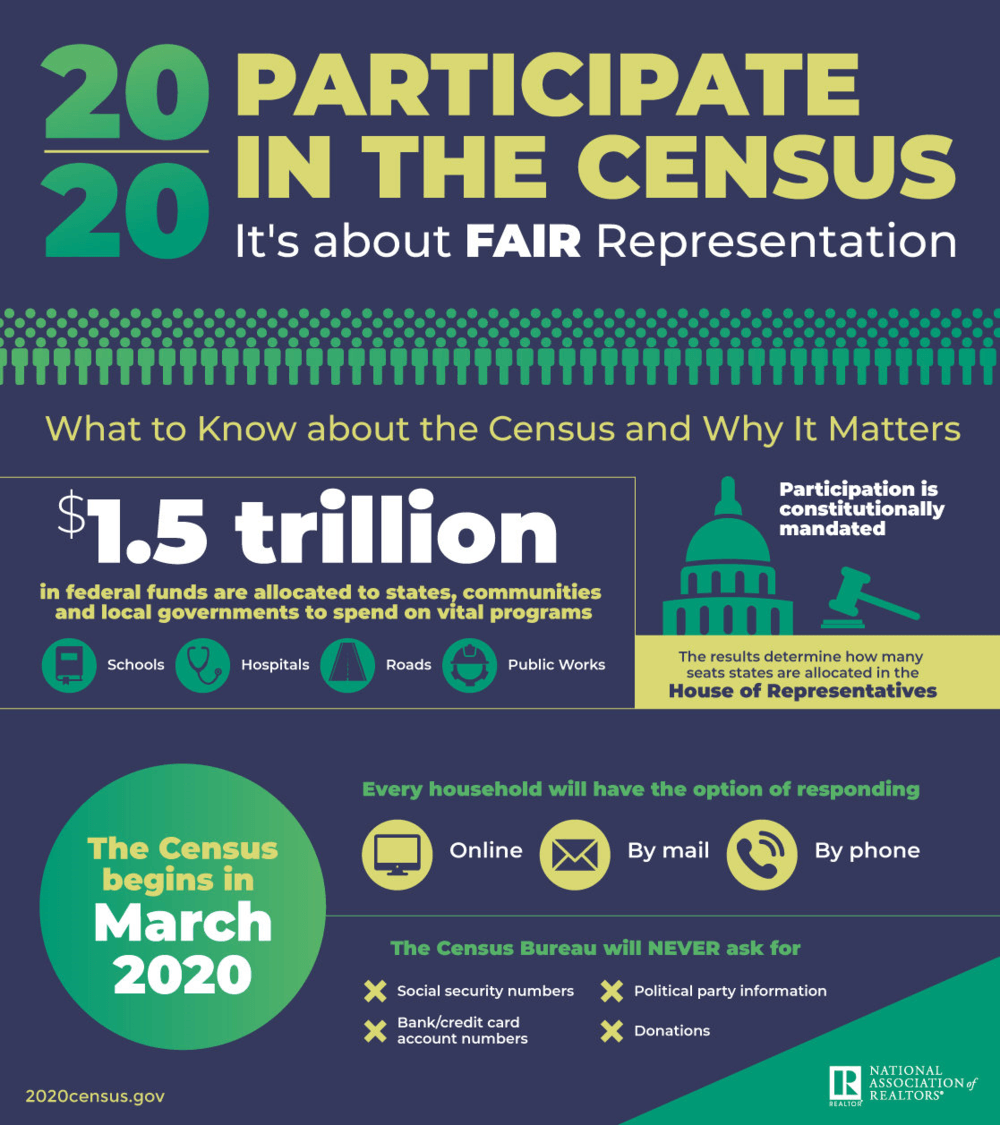Important Information About the Census
Louisiana REALTORS • March 17, 2020
The decennial census is a population count that is mandated by the U.S. Constitution to take place every 10 years. The census is important for all REALTORS® because completing the Census survey means more resources for businesses and communities across the country.
Census data are invaluable to the National Association of REALTORS’ research team. Based upon decennial census data, NAR is able to:
Analyze census data related to the number of homebuyers in a particular area or universe of sales;
Compare census data to NAR’s local and national figures;
Forecast and make projections about housing industry growth;
Evaluate trends in generational housing demands and populations at state and local levels;
Analyze migration trends of recent movers to identify potential customers and markets;
Identify trends in household formation; and
Better understand the population of homeowners who have been affected by natural disasters.
According to the U.S. Census Bureau*, census data are used as follows:
Decision making at all levels of government.
Drawing federal, state, and local legislative districts.
Attracting new businesses to state and local areas.
Distributing over $675 billion annually in federal funds and even more in state funds.
Forecasting future transporta¬tion needs for all segments of the population.
Planning for hospitals, nursing homes, clinics, and the location of other health services.
Forecasting future housing needs for all segments of the population.
Directing funds for services for people in poverty.
Designing public safety strategies.
Development of rural areas.
Analyzing local trends.
Estimating the number of people displaced by natural disasters.
Developing assistance programs for American Indians and Alaska Natives.
Creating maps to speed emer¬gency services to households in need of assistance.
Delivering goods and services to local markets.
Designing facilities for people with disabilities, the elderly, or children.
Planning future government services.
Planning investments and eval¬uating financial risk.
Publishing economic and statistical reports about the United States and its people.
Facilitating scientific research.
Developing “intelligent” maps for government and business.
Providing proof of age, rela¬tionship, or residence certifi¬cates provided by the Census Bureau.
Distributing medical research.
Reapportioning seats in the House of Representatives.
Planning and researching for media as background for news stories.
Drawing school district boundaries.
Planning budgets for govern¬ment at all levels.
Spotting trends in the eco¬nomic well-being of the nation.
Planning for public transporta¬tion services.
Planning health and educa¬tional services for people with disabilities.
Establishing fair market rents and enforcing fair lending practices.
Directing services to children and adults with limited English proficiency.
Planning urban land use.
Planning outreach strategies.
Understanding labor supply.
Assessing the potential for spread of communicable diseases.
Making business decisions.
Understanding consumer needs.
Planning for faith-based organizations.
Locating factory sites and dis¬tribution centers.
Distributing catalogs and developing direct mail pieces.
Setting a standard for creating both public and private sector surveys.
Evaluating programs in differ¬ent geographic areas.
Providing genealogical research.
Planning for school projects.
Developing adult education programs.
Researching historical subject areas.
Determining areas eligible for housing assistance and reha¬bilitation loans.
The census survey can be completed by phone, by mail, and online at 2020census.gov
Please pay attention to the following key dates:
Mid-March 2020: The Census Bureau will be inviting households to participate in the 2020 census*, and households can begin completing the Census survey by mail, phone, or online at 2020census.gov(link is external).
April 1, 2020: National Census Day! This is a nationally recognized day, and by this date every U.S. household will receive an invitation to participate in the 2020 census, and to respond by mail, phone, or online.
June 30, 2020: Last day for households to respond to the census survey.
December 2020: The Census Bureau is required by law to provide an apportionment count to the President and Congress.

Louisiana REALTORS® is accepting applications for the 2028 Region 10 RVP on the National Association of REALTORS® Board of Directors to be voted on by the Board of Directors of Louisiana REALTORS® on Wednesday, March 4, in Bossier City, Louisiana. Eligible candidates can submit the application at the link below by Monday, February 16, 2026, by 5:00 p.m. to be considered for this position. Selected applicant will then proceed through the candidate background process with NAR, and elected by the NAR Board of Directors in October.





